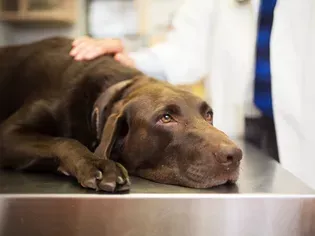Signs of Poisoning in Dogs
Updated on 05/27/24

Unmasking the Hidden Danger: A Comprehensive Guide to Signs of Poisoning in Dogs
As devoted guardians of our canine companions, it's imperative to be vigilant against potential hazards that threaten their well-being. Among these dangers, poisoning poses a significant risk, with potentially life-threatening consequences if left undetected or untreated. By arming ourselves with knowledge and being attuned to the subtle signs, we empower ourselves to respond swiftly, potentially saving our beloved pets' lives.
Recognizing the Red Flags: Common Signs of Poisoning in Dogs
The manifestations of poisoning in dogs vary widely depending on the ingested substance and its potency. However, recognizing these common signs can help you identify if your pet is in distress:
* Gastrointestinal Disturbances: Vomiting, diarrhea, excessive drooling, abdominal pain, and loss of appetite are frequently observed symptoms.
* Neurological Abnormalities: Tremors, seizures, disorientation, incoordination, weakness, and even paralysis can occur.
* Respiratory Distress: Difficulty breathing, rapid breathing, shallow breathing, and coughing are signs of respiratory issues.
* Cardiac Problems: Abnormal heart rate, arrhythmias, and collapse can indicate heart complications.
* Skin Irritation: Redness, swelling, itching, and burns on the skin may be present if the poison came into contact with the dog's skin.
* Behavioral Changes: Lethargy, depression, anxiety, and aggression are often observed behavioral changes.
Examples of Toxic Substances for Dogs
The realm of potential poisons is vast, encompassing both household items and outdoor hazards. Here are a few examples to illustrate the diversity of substances that can harm your dog:
* Household Cleaners: Bleach, ammonia, detergents, and disinfectants can cause chemical burns and respiratory distress.
* Medications: Human medications, such as ibuprofen, acetaminophen, and antidepressants, can be highly toxic to dogs.
* Plants: Many common plants, including lilies, azaleas, and oleander, contain toxic compounds that can lead to various health issues in dogs.
* Rodent Baits: Rat and mouse poisons often contain anticoagulants, which can cause internal bleeding.
* Fertilizers: Fertilizers can contain heavy metals and other chemicals that are harmful to dogs if ingested.
Immediate Response: What to Do if You Suspect Poisoning
Time is of the essence when dealing with poisoning. If you suspect your dog has ingested a poisonous substance, follow these steps immediately:
* Remove the Source: If possible, remove the suspected poison from your dog's reach.
* Call Your Veterinarian or Animal Poison Control Center: Seek professional veterinary assistance immediately. They will provide guidance on what to do next.
* Identify the Toxin (if Possible): If you know what your dog ingested, take the container or substance with you to the veterinarian for identification.
* Do Not Induce Vomiting: Unless specifically instructed by your veterinarian, do not induce vomiting, as it can further irritate the digestive tract or cause aspiration.
* Stay Calm and Monitor Your Dog: While waiting for veterinary care, keep your dog calm and monitor their condition closely.
Prevention: Safeguarding Your Dog from Poisoning
Preventing poisoning is crucial for your dog's well-being. Here are some proactive measures you can take:
* Keep Harmful Substances Out of Reach: Secure medications, household cleaners, and other potential poisons in locked cabinets or on high shelves.
* Supervise Your Dog Outdoors: When outside, keep an eye on your dog to prevent them from ingesting dangerous plants or substances.
* Educate Children and Visitors: Inform children and visitors about the importance of keeping poisons away from dogs.
* Consider Pet Insurance: Pet insurance can provide financial assistance for veterinary expenses, including those related to poisoning treatment.
Empowering Dog Owners: Knowledge and Swift Action
By familiarizing yourself with the signs of poisoning and knowing how to respond, you become an advocate for your dog's health. Timely detection and appropriate action can make a life-saving difference in the event of accidental poisoning. Remember, prevention is key, so prioritize safe storage and supervision to safeguard your beloved companion from the dangers of poisoning.
Explore More Pets

Basic Training
Puppy and Baby Introductions

Working Dog Breeds
All About Search and Rescue Dogs

Dog Treatments
Puppy Vaginitis: Signs, Causes and Treatment

Dog Adoption
After More Than 1,200 Days in the Shelter, Coco Goes Home

Basic Training
How to Train Your Puppy to Go on Potty Pads

Hybrid Dog Breeds
The Difference Between a Mutt, Mixed Breed, or Designer Dog?

Dog Treatments
Nail Problems in Dogs

Puppies
7 Reasons Why Two Dogs Are Better Than One
